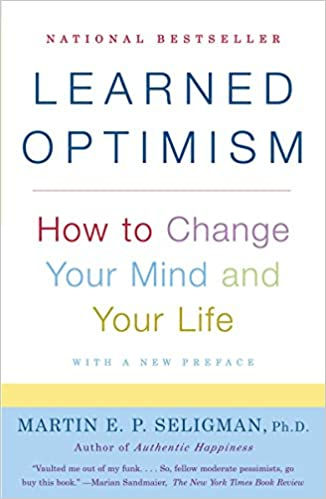


#Seligman learned optimism book how to
Seligman explains how to break an “I-give-up” habit, develop a more constructive explanatory style for interpreting your behavior, and experience the benefits of a more positive interior dialogue. Buy from Amazon Learned Optimism by Martin E.P. Seligman PDF: The father of the new science of positive psychology and author of Authentic Happiness draws on more than twenty years of clinical research to demonstrate how optimism enhances the quality of life, and how anyone can learn to practice it.
#Seligman learned optimism book pdf
Seligman PDF book free online – From Learned Optimism by Martin E.P. He’ll do better in the long run.Download Learned Optimism by Martin E.P. If two prospects are close in raw talent, recruit the optimist. “Optimism tells you who to select and recruit. “The explanatory-style theory of success says that in order to choose people for success in a challenging job, you need to select for three characteristics: I believe that optimistic explanatory style is the key to persistence.” Success requires persistence, the ability to not give up in the face of failure. He will give up too soon when the elusive right melody takes too long to materialize. A composer can have all the talent of Mozart and a passionate desire to succeed, but if he believes he cannot compose music, he will come to nothing. Seligman continues: “I believe that traditional wisdom is incomplete. Enough desire can make up for meager talent.” No matter how much aptitude you have, says traditional wisdom, if you lack desire you will fail. “holds that there are two ingredients of success… the first is ability or aptitude, and IQ tests and SAT are supposed to measure it. Although you to have hope and optimism for a bright future, you also need a healthy dose of realism to ensure success. Seligman addresses the fact that optimism is not always a good thing. The pessimist always takes responsibility for the bad event (internal). The optimist looks to things outside of himself (external) If something bad happens, they think it is representative of their whole life.ĭo we believe that we are responsible for the event, or if something outside of our control was responsible?Īn optimist says: I did it saying (internal)Ī pessimist is more likely to attribute the success to luck, other people’s hard work, or something else (external). If something good happens, they think it was a one-time success. With a bad event, he/she will tend to isolate the incident as specific to that situation. With a good event, the optimist is more likely to extend it to his/her whole life. So, do we think the results of this one event apply to everything in our lives, or just that situation? Pervasiveness: Is it reflective of your whole life? Is it “universal” or is it “specific”? While the pessimist thinks that good things are temporary and bad things are permanent. If it’s a good thing, they tend to think it’s permanent. In case of a bad event, the optimist tends to think it’s a temporary thing. Do you think the result of it is permanent or temporary?! Permanence: Is it permanent or temporary? “There are three crucial dimensions to your explanatory style : permanence, pervasiveness, and personalization.”

So, to solve this problem, the key is our explanatory styles. This theory also applies to humans… we LEARN helplessness when we believe that if we fail once we’ll keep failing in everything! And then give up… And that of course leads to depression. Remarkably, although the first dog avoids the shocks, the second dog curls up in the corner and whimpers as the shock-which he could have avoided-is administered.

So, now both of them can avoid the shocks. Then, the dogs are moved to a new area and taught a new way to avoid the shocks. So, he LEARNS that he is helpless in the face of these shocks. He quickly learns to stop the shocks.Ī second dog does not have a lever. Imagine two dogs: The first dog is slightly shocked but has a lever he can push that will stop the shocks. Learned helplessness theory was developed by Seligman and his colleagues in their work with dogs. It is the great modulator of learned helplessness.Īn optimistic explanatory style stops helplessness, whereas a pessimistic explanatory style spreads helplessness.” “Learned helplessness is the giving up reaction, the quitting response that follows from the belief that whatever you do doesn’t matter.Įxplanatory style is the manner in which you habitually explain to yourself why events happen.


 0 kommentar(er)
0 kommentar(er)
